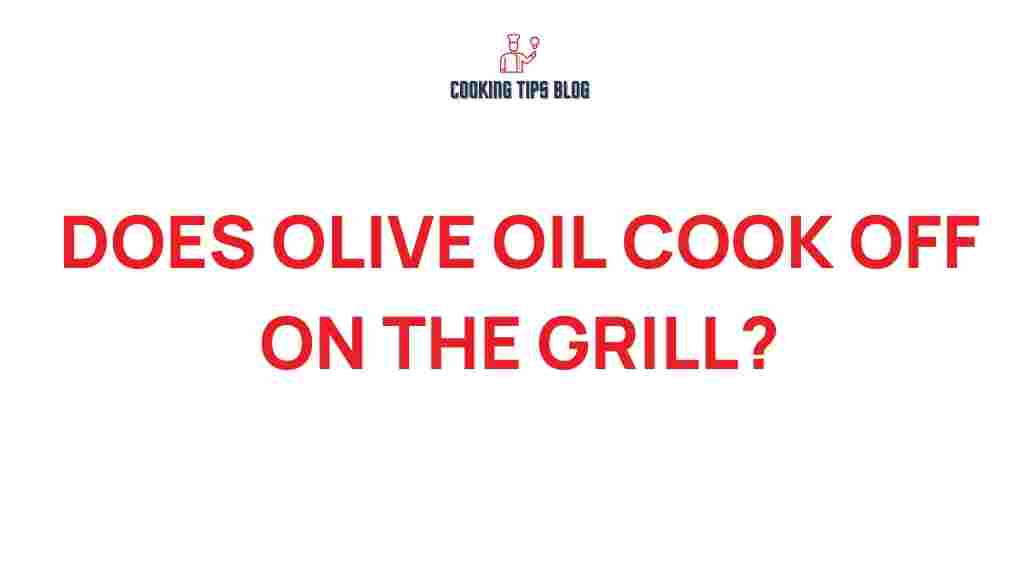Does Olive Oil Really Cook Off on the Grill?
When grilling, many home cooks and grill enthusiasts often debate the role of olive oil. Is it a necessary ingredient for flavor and moisture, or does it simply burn away, leaving no trace? In this article, we will uncover the truth about olive oil and its behavior on the grill. We will explore its properties, benefits, and the best practices for using olive oil while grilling.
Understanding Olive Oil
Olive oil, derived from pressing olives, is celebrated for its rich flavor and health benefits. It contains monounsaturated fats, antioxidants, and vitamins that contribute to a healthy diet. When it comes to cooking, especially grilling, olive oil plays several roles:
- Flavor Enhancer: Adds a rich, fruity flavor to meats and vegetables.
- Moisture Retention: Helps keep foods moist, preventing them from drying out.
- Non-Stick Agent: Reduces sticking to the grill grates, making it easier to flip and remove food.
The Smoke Point of Olive Oil
One of the primary concerns when grilling with olive oil is its smoke point. The smoke point is the temperature at which oil starts to smoke and break down, releasing harmful compounds and altering its flavor. For olive oil, this varies depending on the type:
- Extra Virgin Olive Oil: Smoke point around 375°F (190°C).
- Pure Olive Oil: Smoke point around 465°F (240°C).
- Light Olive Oil: Smoke point around 465°F (240°C).
When grilling, temperatures can exceed these smoke points, especially if you’re using direct heat. This leads us to the question: does olive oil really cook off on the grill?
Does Olive Oil Really Cook Off on the Grill?
In short, yes, olive oil can cook off on the grill, but several factors influence this. The type of olive oil you use, the grilling method, and the temperature at which you’re cooking all play significant roles. Here’s a detailed breakdown:
1. Type of Olive Oil Matters
As mentioned, different types of olive oil have varying smoke points. Extra virgin olive oil, while flavorful, has a lower smoke point and is more likely to burn off compared to pure or light olive oil. If you’re planning to grill at high temperatures, consider using pure or light olive oil.
2. Grilling Method
There are various grilling methods, including:
- Direct Grilling: Cooking food directly over the flame or heat source.
- Indirect Grilling: Cooking food next to the heat source, allowing for slower cooking.
When using direct grilling, olive oil is more likely to burn off quickly due to the intense heat. Indirect grilling allows for a more controlled temperature, which may help retain some of the oil.
3. Cooking Time
The duration of cooking can also affect whether olive oil cooks off. Shorter cooking times might not allow enough heat for the oil to burn off completely, while longer grilling times increase the risk of burning.
Using Olive Oil on the Grill: A Step-by-Step Process
To make the most out of olive oil while grilling, follow these steps:
- Select the Right Olive Oil: Choose a type based on your grilling method. For high heat, opt for pure or light olive oil.
- Preheat the Grill: Preheat your grill to the desired temperature before adding any oil.
- Coat Your Food: Lightly coat your meats or vegetables with olive oil. This helps in flavor retention and prevents sticking.
- Monitor the Temperature: Keep an eye on the grill temperature. If it gets too hot, consider reducing the heat to avoid burning the oil.
- Use Indirect Heat When Possible: For longer cooking times, utilize indirect grilling to maintain a lower temperature and keep the oil from burning.
- Finish with Olive Oil: For added flavor, drizzle a little olive oil over your grilled food just before serving.
Troubleshooting Tips
If you find that your olive oil consistently cooks off or burns, consider these troubleshooting tips:
- Adjust Your Cooking Temperature: Lower the temperature if you notice the oil smoking.
- Try a Different Oil: If high heat grilling is common in your cooking, experiment with oils that have higher smoke points, such as avocado oil.
- Limit Cooking Time: Reduce the time your food spends on the grill if you’re using olive oil.
- Check Grill Grates: Ensure your grill grates are clean and well-oiled to prevent food from sticking, which can lead to longer cooking times.
Additional Benefits of Using Olive Oil
Beyond the flavor and cooking properties, olive oil offers several health benefits:
- Heart Health: Rich in monounsaturated fats, it supports cardiovascular health.
- Anti-Inflammatory Properties: Contains antioxidants that can reduce inflammation in the body.
- Improved Digestion: Aids in the absorption of nutrients and supports digestive health.
For those interested in the health benefits of olive oil, check out this detailed article on the health benefits of olive oil.
Conclusion
In conclusion, olive oil does cook off on the grill, but its behavior largely depends on the type of oil, the grilling method, and the cooking temperature. To maximize the benefits of olive oil while grilling, select the right type of oil, monitor your heat levels, and consider using it as a finishing touch. By following these guidelines, you can enhance both the flavor and health benefits of your grilled dishes.
For more tips on grilling and cooking with olive oil, explore our other articles here!
This article is in the category Tools and created by Cookingtipsblog Team
